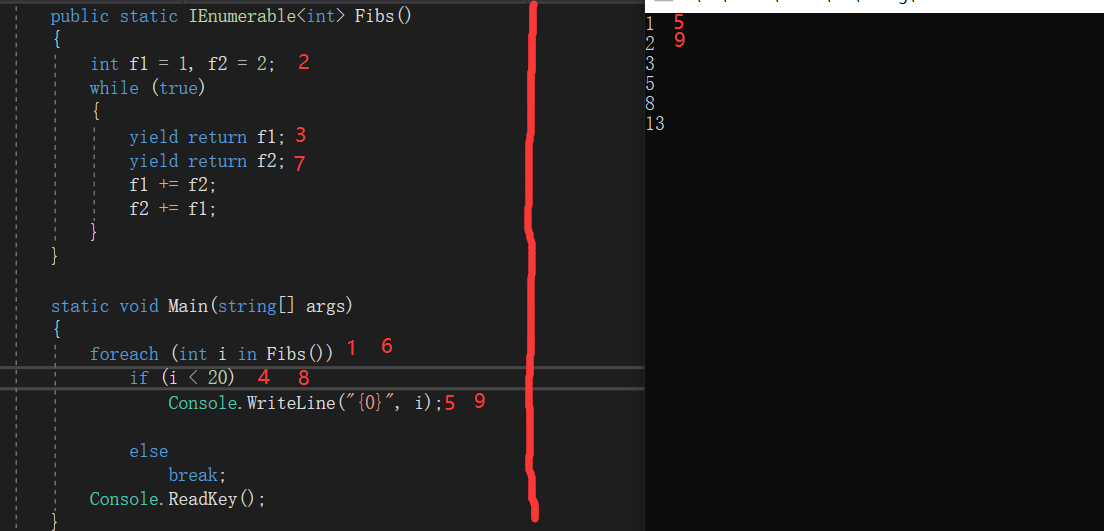Python微信订餐小程序课程视频
https://edu.csdn.net/course/detail/36074
Python实战量化交易理财系统
https://edu.csdn.net/course/detail/35475
1.迭代器方法
可以使用foreach循环语句进行的迭代的方法,称为可迭代方法,或者迭代器方法。
迭代器用法法介绍。
迭代器用于依次返回每个元素,一般用于foreach循环语句。迭代器方法需要使用yield return语句。
yield return 语句介绍
保持代码的当前位置,在下一次调用迭代器方法时执行。

迭代方法在使用过程中左右步骤对应。yield return语句主要是返回一个结果作为函数调用的结果。并记录当前运行位置,当下次函数被调用时,在当前位置执行这个函数。在迭代块中除了yield return外,不允许出现普通的return语句。
迭代方法使用的命名空间为using System.Collections.Generic;
下面代码为迭代器使用的具体代码
| 123456789101112131415161718192021222324 | class Program{public static IEnumerable<int> Fibs(){int f1 = 1, f2 = 2;while (true){yield return f1;yield return f2;f1 += f2;f2 += f1;}}static void Main(string[] args){foreach (int i in Fibs())if (i < 20)Console.WriteLine("{0}", i); elsebreak;Console.ReadKey();} } |
IEnumerable是泛型定义的里面的int关系到你迭代对象yield return返回值的类型。如果你定义IEnumerable那么你返回的值是int类型,如果你定义IEnumerable那么你的返回值是string类型以此类推。如果你想以某个条件结束方法。可以使用外面的条件如上图所示。也可以使用yield break。
| 123456789101112131415161718192021222324 | class Program{public static IEnumerable Fibs(){string f1 = "1", f2 = "2";while (true){yield return f1;yield return f2;f1 += f2;f2 += f1;if (f1.Length > 8)yield break;}} static void Main(string[] args){foreach (string i in Fibs()) Console.WriteLine("{0}", i);Console.ReadKey();} } |
2.手动实现迭代器方法
首先是通过使用接口IEnumerable的方式,然后编写IEnumerator GetEnumerator()的方式。在代码中控制索引位置,和循环次数。如果索引位置出错则使用代码throw new NotImplementedException()报错。
| 1234567891011121314151617181920212223242526272829303132333435363738394041424344454647 | using System;using System.Collections;using System.Collections.Generic; namespace test02{class Program{static void Main(string[] args){object [] e = new object[5] { 1, 2, 3, 4, 5 };Itear01 s = new Itear01(e,2);foreach (object i in s)Console.WriteLine("{0}", i);Console.ReadKey();} } public class Itear01 : IEnumerable{object[] values;int StartPoint=-1;int current=0;public Itear01(object[] values,int StartPoint){this.values = values;this.StartPoint = StartPoint;}public IEnumerator GetEnumerator(){if(this.StartPoint==-1)throw new NotImplementedException();while(true){yield return this.values[StartPoint];StartPoint = (StartPoint + 1) % values.Length;current++;if (current == values.Length){break;}} }}} |